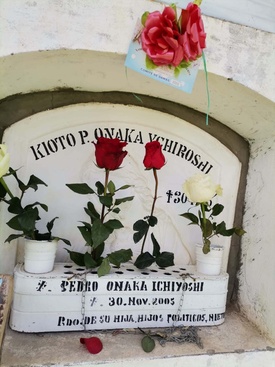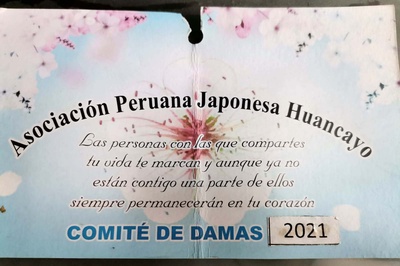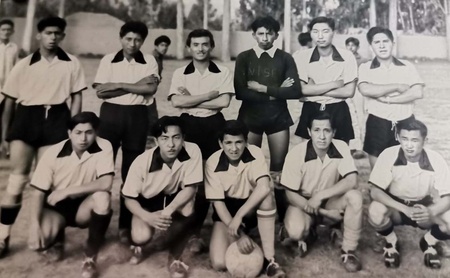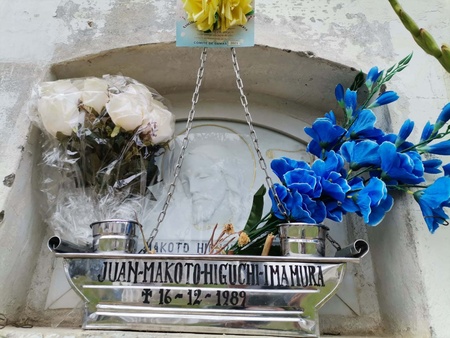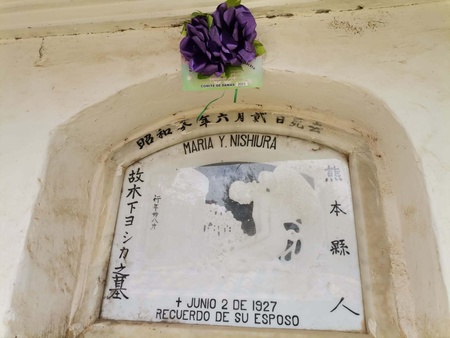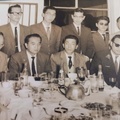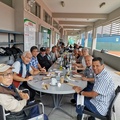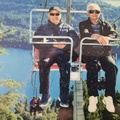How many times my steps are directed, they will always go to the Jauja Cemetery. Fast as the youth that passed and was first, or this past that I live today in every attitude of seeing the tombstones, in the concert of the huaynos that is heard every Saturday somewhere, where a relative or friend sleeps the deep sleep of the eternal life.
Seven years have passed since my last trip and today, at eighty-two years old, my dream once again came true. The pace was slow and the vision a little indecisive, but I had four friends who were by my side for company. Alejandro Nakao and his wife Anita Minami, Paulina Goya and Bertha Matzumoto. All of them elderly.
The most practical thing was to carry and operate the cell phone and Celinda, with her kindness to help, was the one who accompanied me the three days I visited the cemetery. She was the one who carried the ladder, we looked for the tombstones of the deceased from the Japanese colony, she took the photo, she put the flower on it, a beautiful rose, and we continued until we had ninety-nine shots of tombstones from different years.
The generous help was to find on each tombstone of the deceased in the colony a beautiful light blue card with a red ribbon decoration. This card said: Peruvian Japanese Association Huancayo, along with the phrase:
“The people you share your life with mark you and, although they are no longer with you, a part of them will always remain in your heart.”
Ladies Committee, 2021.
Loneliness is part of our life, it accompanies us when we are born, live and die. Today in the city of Jauja perhaps the Japanese colony no longer exists. On my trip seven years ago, with my friends Samuel Matsuda, Víctor Ykeda and Juan Kanashiro, José Kato, who had his bazaar in the main square, and with whom I played in my childhood, told me that he and Julio Tayra maybe They were the only ones left. Then I found out that Julio and José had died and that practically no one was left from the Japanese colony in Jauja.
When visiting Jauja with my friends and arriving at its beloved and preserved cemetery, I was happy that my friends from the Ladies' Committee of the Peruvian-Japanese Association of Huancayo had such a nice gesture of visiting and bringing each one a prayer and flowers that symbolize the I remember and love our ancestors.
Thank you very much, Huancaína friends, the visit to our cemetery made me live and remember those times when our parents played their baseball games at the Junín de Jauja Stadium and ping pong at the “Los Andes” Club premises, back in 1955 and 1956. Or perhaps the carnival parties of 1959 and 1960 at the Nisei Jauja Club premises.
Or just to think that it was the Nikkei Huancaínos who gave us a “little hand” so that today Jauja has a Fire Company, and to always remember Crisanto Shiraishi, Arnado Uchiyama, Víctor Aritomi, Alberto Okugawa, Pedro Aritomi, Hugo, Paco and Víctor Miyadi, Silvio Murakami, Isaac Araki, Carlos Yamaguchi, Alberto Akiyama, Julio Watanabe, Ángel Utsunomiya, Nicolás Miyamoto, Vicente Matsumura, and many other Nisei Huancaínos from those years who collaborated with us.
Did they leave traces? Yes, they left them. Poverty for many in the Japanese colony was palpable and with the little we lived, we were happy. Our parents worked twelve to fifteen hours in their stores and businesses and still had time to have social and community life. They taught us values, the most palpable example was the attitude of their lives. Today to venerate them in a simple niche is to offer them our respect, gratitude, prayers and memories for everything they have given and left us.
The entrance to the cemetery was an avenue full of eucalyptus trees. Those trees pretended to have a voice of command, but deep down it was the perfume they emanated. The solidity of their stems and the size accumulated over the years made them a parade of pure and healthy vegetation. Today only a few remain scattered at the entrance.
And what we always venerate upon entering, the flower stands in their total diversity, accumulate the glimpse of roses, the feeling of chrysanthemums, the halo of thoughts, the rebirth of marigolds, the peace of gladioli, society of daisies, the diversity of geraniums, the light of carnations and the vitality of brooms. It was always looking towards the main door and, like today, on Saturday. Masses with orchestra were present in many niches and tombs. Tradition in Jauja is always respected.
The masses and prayers to the dead are accompanied by typical orchestras with traditional huaynos and the family crowd. For me it was a surprise to hear only the notes of the huayno “Huarancayo de mis penas”, it was to return to my past and take refuge in the chalet on Ricardo Palma Avenue.
At the end of my visit, Celinda found tombstone ninety-nine. He climbed the stairs, took the photo, kissed the last flower and placed it on the tombstone. My visit had ended in the middle of a large family visiting a niche close to the one we had been to. They, so kind, invited me to have a glass of liquor and between questions we started singing. My duet was with a lady younger than me, but who knew the huaynos from before like me.
“Dear garment, little road of Huancayo, Jauja, tarmeño hummingbird, dear friends.”
A custom so typical of the mountains that, when I remembered it after 65 years, being with my friends came to mind. Edilberto Pizarro, Raúl Huaccho, Félix Rivera and me. The four of us were looking for the parties of our youth and one of them was at the gates of the cemetery. Maybe in one of the houses of which there are many today.
I always remember that that night the party ended at three in the morning and, in complete darkness, no one came out. Knowing that the cemetery was next to us meant that we had to wait in the house until dawn gave us the assurance that we would not see or feel anything strange.
In addition, we had an avenue full of old eucalyptus trees, where the wind made the treetops pretend to be nostalgic for a dark night and with the fear of meeting our neighbors from the cemetery again. Today everything has changed, the scenery, the light poles, the track that crosses and goes to the city of Tarma make the area busy and the traffic busy.
Returning to my beloved Jauja will always be my task. Only my body will tell how long it represents in the picture of my life that I continue to fend for myself. And, if there are friends, my trip will be complete joy in reaching my destination in the mountains. We will be there with the same gratitude as always and hoping that our lives have the happy ending that we all want.
© 2022 Luis Iguchi Iguchi


